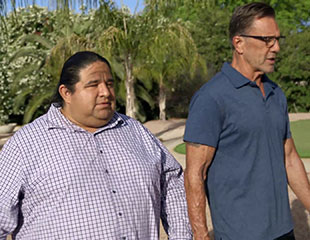Helping Hands
5-minute read
Helping Hands
5-minute read
The cliffside gave way beneath him, and Phillip found himself sliding down a deep, muddy riverbank toward rushing floodwaters below.
“I thought I was dying,” Phillip recalls. “I thought I was gonna ... just suffocate, you know?”
Suddenly, Phillip felt a hand reach into the mud and grasp his. That hand pulled him from the muck, saving his life. But it wouldn’t be the last time Phillip needed to be lifted from a desperate and deadly situation.
Phillip had joined the military three years before the incident because he wasn’t ready for college and wanted to see the world. At first, he had fun serving as a Navy Seabee, enjoying deployments to Japan, to Puerto Rico, and throughout the Caribbean. Then, in 1998, he was sent to Central America to provide aid in the wake of Hurricane Mitch, the deadliest Atlantic hurricane in more than 200 years. The hurricane made landfall in Honduras and stalled, dumping more than three feet of rain, killing thousands of people, and leaving even more survivors homeless.
The hurricane devastated the small country’s infrastructure and destroyed sewage systems, resulting in outbreaks of cholera, dysentery, and malaria. As Phillip recalls, “It was just a mess.”
In the floodwater, mudslides, and raw sewage that remained after Hurricane Mitch dissipated, Phillip witnessed and experienced a series of disturbing events that would haunt him for years to come.
“It’s just death everywhere,” he explains. “It was just sickening there. Just the smells and everything were just, were just — it was like hell on Earth.”
Phillip left the military a changed man. The hopeful enlistee had become an irritable Veteran who bristled with disgust when people around him complained, thinking, “You don’t know how good you have it.” His agitation soon gave way to fighting, and his mental health deteriorated.
Frequently unable to sleep and plagued with nightmares when he did, Phillip started thinking that people from Honduras were visiting him in his dreams and that he was seeing ghosts. Sleep became something to avoid, because his nightmares were just too painful.
Seeking a distraction from his trauma and a way to put off sleep, Phillip started using methamphetamine. He began alienating people, borrowing money, burning bridges, and isolating himself. Over the next 10 years, he lost his girlfriend and then his home, his car, and finally, his freedom.
Jailed multiple times on vagrancy and related charges, Phillip finally got some clarity on his situation. In his cell, he prayed for help — for a way back out of the muck. He found that help at VA.
Phillip’s life changed almost immediately. VA’s resources for homeless Veterans provided him with transitional housing, followed by his own HUD-VASH housing a couple of months later. He received anger management treatment, recovery services to overcome his meth use, and psychiatric help to manage his PTSD. He still has nightmares sometimes, but they’re not as frequent or unwelcome as they once were.
I’m dealing with them in a better, better light.Phillip
“They’re beautiful gifts,” Phillip says now. “I’m supposed to remember these things. I’m not supposed to forget, like I wanted to before, and I’m dealing with them in a better, better light.”
Phillip’s relationships have improved, because he’s happier now. He isn’t defensive anymore. He’s approachable, teachable, and even huggable. “I’m easy to hug. Everyone wants hugs from me,” he admits.
Phillip has also become a state-certified peer support specialist. He wanted to help people with mental health issues, he says, because “if it wasn’t for some Veterans talking to me, I wouldn’t be here right now.”
Phillip hopes other Veterans won’t ignore or dismiss the recovery options, resources, and opportunities available to them. When some feel guilty about accepting the help, he tells them they earned it and deserve it.
“If you’re hurt or you have relationship problems — you know, back problems, you got shot in the ribs, your ribs keep hurting — you go to VA, man! Don’t be like, ‘Oh, give it to somebody else who needs it.’ … You need it, man. Get the help you need,” Phillip says. “You deserve it.”

